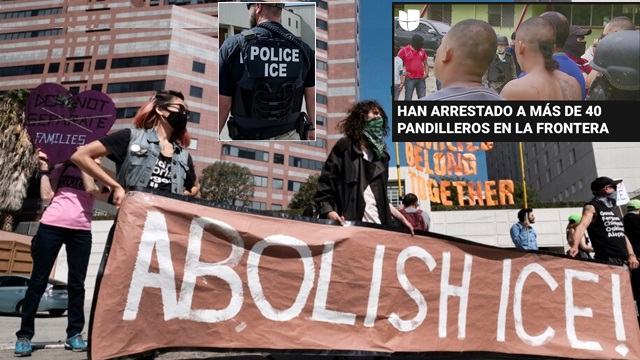 Sanctuary Communities: The Democratic Abomination that Shelters Illegals and Criminals
Sanctuary Communities: The Democratic Abomination that Shelters Illegals and Criminals
Introduction
The so-called "sanctuary communities" created by Democrats are being used as refuges for illegal immigrants and criminals. These communities have become safe havens for individuals who have entered the country illegally and have committed serious crimes both in their home countries and in the United States itself. They proclaim themselves as holy zones that do not cooperate or limit their cooperation with federal immigration authorities, while in practice they are protecting illegal immigrants and preventing them from being deported or penalized for violating immigration laws and/or the crimes committed. The idea of sanctuary communities is not new, but Democrats promoted it as a political weapon against the first Trump administration and are strengthening it to oppose the deportations that are expected during his second term. This issue gained relevance during the Biden-Kamala administration due to the disaster of the growing migrant crisis and the failed open border policies that have weakened U.S. security to unprecedented levels.
Behind the Sanctuary Façade
These communities present themselves as places of refuge and protection for those who are in vulnerable situations, whether due to socioeconomic reasons or their immigration status. However, these communities are being used as shelters by criminals and individuals seeking to evade justice. One of the main problems of these sanctuary communities is that they harbor individuals who have entered the country illegally, which goes against U.S. immigration laws and creates legal conflicts with local authorities, who become complicit sponsors of illegal activities that affect the enforcement of laws and the safety of their citizens and the nation.
Moreover, these communities often protect criminals who have committed serious crimes, putting the safety of society at risk. It is important to highlight that the impact of these sanctuary communities can have negative consequences at both social and legal levels.
On one hand, protecting criminals and allowing impunity can foster crime and insecurity in the area. On the other hand, hiding or even assisting illegals can generate tensions with authorities and provoke legal conflicts that affect the entire community. In this sense, it is fundamental to analyze the perspectives surrounding sanctuary communities.
Supporters argue that these zones show solidarity and protect violators of immigration laws, claiming that the laws are unjust and that it is necessary to support those who violate them. However, the majority believe that these so-called sanctuary communities are used to protect criminals and circumvent the law, which jeopardizes safety and social order.
Analysis of the Legality of Sanctuary City Policies
Analyzing the legality of sanctuary city policies in relation to the treatment of foreigners who remain in the United States without legal authorization can be complex and depends on various legal, social, and political factors.
Federal vs. State/Local Laws
Federal law prohibits the deliberate "harboring" or "protection" of unauthorized foreigners in the context of helping them evade immigration authorities. However, sanctuary cities disguise their cover-up purposes by arguing that their policies are not designed to help immigrants avoid law enforcement but to protect communities and ensure that residents feel safe interacting with the police, regardless of their immigration status.
Enforcement Priorities
Sanctuary policies often focus on prioritizing local law enforcement over federal. Many of these cities have decided not to criminalize illegal immigrants, arguing that the criminalization of immigration is not a priority for their law enforcement resources. In this context, the protection they offer is masked with language defining that it does not necessarily mean hiding or harboring, but rather not collaborating or coordinating with ICE in cases where the crime is unrelated to violence or an immediate danger to the community.
Community Trust
Local authorities defend sanctuary policies as a way to build trust between the immigrant community and the police, arguing that allowing people to feel safe reporting crimes and collaborating with law enforcement is fundamental to public safety. By avoiding actions that may be perceived as collaboration with ICE, authorities hope to encourage community participation in crime prevention. However, the reality shows that they are fostering and stimulating illegal immigration and an increase in criminal activities in communities, as is the case in New York.
Legal Challenges
Sanctuary cities pose a constant challenge to federal authorities and skirt the limits of criminal responsibility as they hinder the enforcement of immigration law, which is the concealed goal of their "sanctuary" policies. The New York Post notes that in the Queens neighborhood of New York, illegal immigrants represent 60% of arrests. This situation falls directly on the status of the Big Apple as a sanctuary city, which prevents local police from collaborating with immigration services (ICE) in cases where suspects are believed to be in the country illegally. Additionally, the New York Police Department states that it is prohibited from tracking the immigration status of offenders.
Sanctuary city laws make it "almost impossible" for authorities to manage the problem. "The city of New York eliminated a tool to rid itself of violent criminals. To make matters worse, the New York police assert that the illegal immigrant community is perfectly aware of the lenient policies—if one can call them that—regarding crime in the city, where offenders are arrested and immediately released. Authorities that proclaim and demand compliance
with sanctuary cities are not only promoting illegal immigration but also fostering a culture of committing crimes without consequences and remaining in those communities with absolute impunity to continue violating the laws of the United States.
The Deportation of Illegal Criminals: Justice and Security
In the American context, illegal immigrants who commit crimes not only break the law but also jeopardize the safety of society. Deporting these individuals is a necessary measure to enforce the law and safeguard the security of citizens and legal residents.
Legality and Morality of Deportation
Allowing criminals to remain in the country only fosters impunity and disorder. Deportation is considered a just act because those who committed crimes have had the opportunity to live legally in the United States but chose to ignore the laws and, therefore, will be deported.
Principle of Equity
It is fundamental for those who have followed the legal immigration process to ensure that those who choose to commit crimes face consequences and are deported and/or incarcerated according to the severity of the criminal acts they have committed. Otherwise, the efforts of those who have worked hard to establish themselves legally in the country would be minimized, and they deserve to be welcomed and provided with the necessary tools for integration into American society.
Arguments Against Deportation
Some argue that deportation is inhumane, claiming that it separates families and causes emotional difficulties. However, it is crucial to remember that these individuals made choices that jeopardized their immigration status by violating U.S. laws. Deportation is thus presented as a consequence of their actions.
Deterrent Effect
Deporting illegal criminals is not just about enforcing the law; it also serves as a deterrent to other illegal immigrants. Allowing those who violated the law to remain without consequences would send a wrong message about the norms and their enforcement, encouraging the proliferation of violations of established laws.
The United States: A Country of Laws
While the United States is a nation of immigrants, it is also a country that operates under a legal framework. Deporting illegal criminals does not reflect discrimination but a commitment to maintaining order and safety in society. Those who wish to live in the United States must do so legally and respect established laws.
Protection of the Community
Deporting individuals who have proven to be a danger is a way to protect the community. These individuals have committed crimes and have shown no willingness to comply with the nation's regulations. The government has a responsibility to protect its citizens, and deportation is part of fulfilling that duty.
Conclusion
The deportation of illegal criminals in the United States is a matter of justice and security. These individuals have broken the law and pose a danger to society, justifying the need to enforce immigration laws. Deportation is not a discriminatory act but a logical response to the violation of norms and laws. It is vital to maintain the integrity of the legal system and ensure the safety of all residents.
José Tarano is a technical producer, graphic designer, collaborator, and researcher at Patria de Martí ► and The CubanAmerican Voice ►. He holds a bachelor’s degree in Electrical Engineering in Telecommunications from José Antonio Echeverria Superior Polytechnic Institute (ISPJAE). In addition, he is the founder and director of Electronics JR Computer Design and Service ►, a computer and information technology services company. Originally from Santiago de las Vegas, Havana, Cuba, he currently resides in the United States.


 🖋️Author Jose Tarano
🖋️Author Jose Tarano